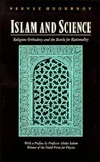What do you think?
Rate this book


176 pages, Paperback
First published January 1, 1991
Although there's no new edition of his book available, alas, Hoodbhoy has more recently (August 2007) published a longish relevant article in Physics Today, called "Science and the Islamic World: The Quest for Rapprochement". You can find it online here: http://ptonline.aip.org/journals/doc/PHTOAD-ft/vol_60/iss_8/49_1.shtml?bypassSSO=1.
I really can't get over how much I enjoyed Islam and Science -- the pleasure all the greater because it was so unexpected: from an initial browse, I'd anticipated the book would be a bit sort of academically po-faced. Pam's weary of me raving about it and I imagine that, by now, so are you.